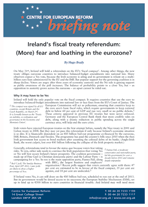The single market & competition policy
Ireland's fiscal treaty referendum: (More) fear and loathing in the eurozone?
11 May 2012
Ireland votes on the EU’s new fiscal compact on May 31st. Hugo Brady assesses the chances of a Yes and the consequences of a No.
Stable public finances require stronger business investment
26 March 2012
Economic recovery in Europe is being held back by the unprecedented weakness of business investment. Despite a secular decline in business taxation and labour market reforms that have boosted the power of capital relative to labour, the ratio of investment-to-GDP across the EU is at a 60 year low. Rather...
Issue 83 - 2012
23 March 2012
- How to keep Britain in the EU, Charles Grant
- Stable public finances require stronger business investment, Simon Tilford
- A new political bargain in Afghanistan, Edward Burke
Greece's real challenge
03 February 2012
Greece's new bail-out package needs less austerity and more structural reforms. A bloated and immobile public sector remains a drag on growth.
The ECB must stand behind the euro
28 November 2011
The eurozone is now subject to a full-blown run on its bond market. Spanish and Italian borrowing costs are now higher than those of Greece, Ireland and Portugal when they were forced to seek bail-outs from the EU and IMF. The crisis has spread to Belgium and France, and even...
Why stricter rules threaten the eurozone
09 November 2011
To restore confidence in the eurozone, leaders must fix its institutional flaws and stretch some rules in the interim. Instead, they are doing the opposite.
Innovation: How Europe can take off
08 July 2011
Every EU government supports innovation, believing that it will help Europe to meet the numerous economic, social and environmental challenges that it faces.
Issue 77 - 2011
25 March 2011
- Europe needs a military avant-garde, Charles Grant
- The eurozone's grand bargain: Political pain without economic gain? , Philip Whyte
- The EU budget: The Union risks having the wrong debate, Stephen Tindale
Issue 76 - 2011
28 January 2011
- European political parties are the key to EU legitimacy, Sir Julian Priestley
- A new opportunity for EU foreign policy, Charles Grant, Katinka Barysch, Tomas Valasek
- Is Germany really rebalancing?, Simon Tilford
Issue 75 - 2010
26 November 2010
- The eurozone enters a critical phase, Simon Tilford
- The next five years of the euro crisis: Five key questions, Charles Grant
- Britain cannot afford to neglect EU defence efforts, Clara Marina O'Donnell
Issue 74 - 2010
24 September 2010
- The political consequences of the euro crisis, Katinka Barysch
- The midterm elections, Europe and US foreign policy, Tomas Valasek
- The EU's new supervisory architecture - evolution or revolution?, Philip Whyte
Issue 73 - 2010
30 July 2010
- The US-China 'reset': An opportunity for the EU, Charles Grant
- The EU must support clean energy, not dirty coal, Stephen Tindale
- A childish take on the eurozone crisis, Philip Whyte
Issue 71 - 2010
26 March 2010
- There can be no eurozone stability without economic growth, Simon Tilford
- Should Britain leave EU police and justice policy?, Hugo Brady
- The EU must deliver on its commitment to Pakistan, Clara Marina O'Donnell
The Lisbon scorecard X: The road to 2020
15 March 2010
The EU's Lisbon agenda has failed to deliver what it promised. Although most member-states have made some progress towards the targets they set themselves in 2000, their commitment to reform has been half-hearted.
How to build an EU energy market
18 February 2010
Unbundling the supply of energy from its transport, moving Europe towards a low-carbon energy system, and getting the Nabucco pipeline built – these were the priorities of the last energy commissioner, Andris Piebalgs. His successor, Günther Oettinger, will write his own to-do list. The EU now has a dedicated climate change commissioner, Connie Hedegard, with whom Oettinger will have to work closely.
Issue 69 - 2009
27 November 2009
- An open letter to David Cameron, Charles Grant
- Sharing the burden of a weaker dollar, Simon Tilford
- Ukraine and the EU: A vicious circle?, Tomas Valasek
Issue 68 - 2009
25 September 2009
- Europe leaves behind the era of treaty change, Charles Grant
- Europe's imbalanced response to the financial crisis, Philip Whyte
- Britain must pool defence capabilities, Clara Marina O'Donnell
Britain and the EU: The cost of leaving
03 August 2009
Britain’s media and political class have a right to be sceptical about the EU, even hostile to it. But they also have an obligation to be honest about the economic implications of a retreat from full membership of the Union.
Britain’s eurosceptics need to come clean
25 June 2009
Britain’s media and political class have a right to be sceptical about the EU, even hostile to it. But they also have an obligation to be honest about the economic implications of a retreat from full membership of the Union. Their failure to do so is dishonest and poses a serious risk to Britain’s prosperity.
Are the British the new French?
05 May 2009
The British tend to deride France as a hopelessly statist, anti-entrepreneurial country full of bolshie workers intent on extracting disproportionate rewards for their labour and a state too weak to resist them. This characterisation is not wholly inaccurate.



























